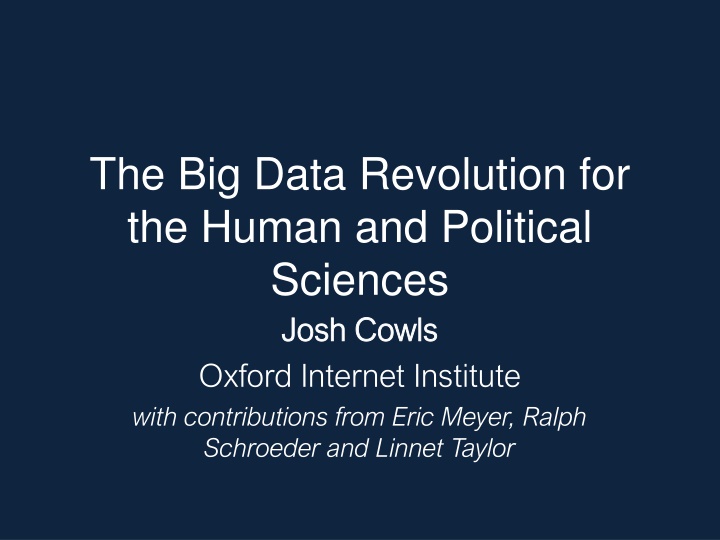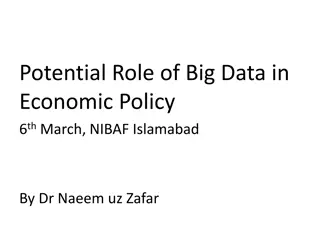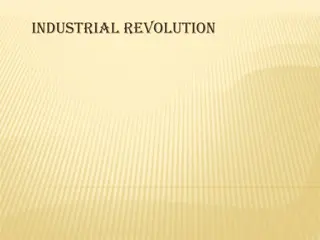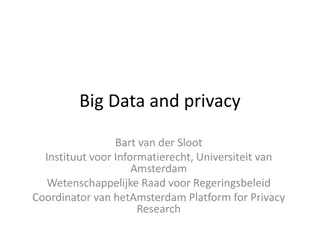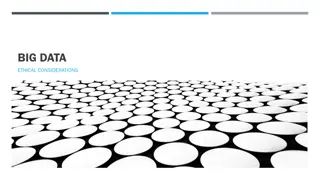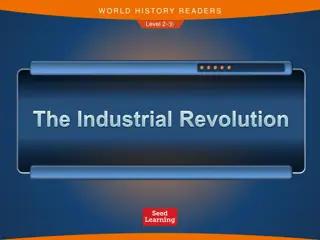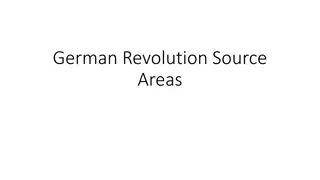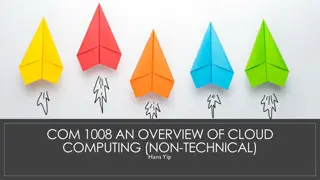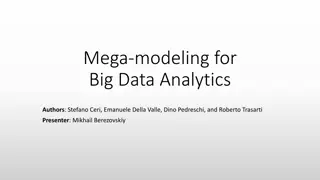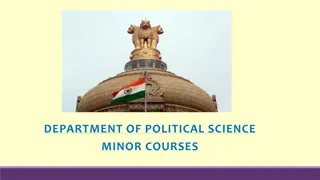Big Data Revolution in Human and Political Sciences
Exploring the impact of big data on human and political sciences, this research delves into definitions, challenges, and future directions in utilizing large-scale and diverse data sets. With a focus on practical, ethical, and epistemological considerations, the study highlights the opportunities and complexities presented by accessing and using big data for social science research, supported by projects funded by the Alfred P. Sloan Foundation.
Download Presentation

Please find below an Image/Link to download the presentation.
The content on the website is provided AS IS for your information and personal use only. It may not be sold, licensed, or shared on other websites without obtaining consent from the author.If you encounter any issues during the download, it is possible that the publisher has removed the file from their server.
You are allowed to download the files provided on this website for personal or commercial use, subject to the condition that they are used lawfully. All files are the property of their respective owners.
The content on the website is provided AS IS for your information and personal use only. It may not be sold, licensed, or shared on other websites without obtaining consent from the author.
E N D
Presentation Transcript
The Big Data Revolution for the Human and Political Sciences Josh Cowls Josh Cowls Oxford Internet Institute with contributions from Eric Meyer, Ralph Schroeder and Linnet Taylor
Overview Background Definitions Three challenges: Practical Ethical Epistemological Future directions
Background Research Assistant at the Oxford Internet Institute, 2013 - present Projects: Accessing and Using Big Data to Advance Social Science Knowledge Big UK Domain Data for the Arts and Humanities Editing the Public Sphere
Accessing and Using Big Data to Advance Social Science Knowledge Funded by the Alfred P. Sloan Foundation 2012 2014 Data sources: 125 interviews, mainly with social scientists but some interviewees from business, government Reports, workshops, publications No representative sample, but some patterns of disciplinary and skills background and career trajectory NB where unattributed, quotes used in this presentation are excerpted from interviews conducted as part of this project.
Big Data: our definition Big data are data that are unprecedented in scale and scope in relation to a given phenomenon. They are often streams of data (rather than fixed datasets), accumulating large volumes, often at high velocity.
Big Data: other definitions Transactional (Margetts et al) Things that one can do at a large scale that cannot be done at a smaller one (Mayer- Shonberger and Cukier) The 3 Vs : volume, velocity, variety but also veracity, visualisability? (Gartner)
... what Big Data isnt A generalisable, quantifiable amount of data A race to the top (Mutually Assured Distraction) The same for every discipline, field or sector
A more workable definition The Big Data phenomenon might be less about what the dataset is and more about how we work with it
Three challenges of using big data Practical Epistemological Ethical
Three challenges of using big data Practical Epistemological Ethical
The practical challenge The big data skills gap Growth of collaboration: the case of web archives
The Big Data skills gap I m self taught. I had to learn a lot of the stuff that I m using now by myself because there weren t any provisions in the courses that I took either as an MSc or as a DPhil. ... social scientists don t get good training to work in multidisciplinary teams of the sort that big data require Sandra Gonzalez-Bailon, Annanberg School of Communication, University of Pennsylvania
The Big Data skills gap I think the problem is the skills gap. I don t think lots of political science departments are really keyed into teaching this area. They might want to hire computer scientists to do some of it, but they don t see that their political scientists should have this sort of skill in their tool kit, they don t see it in the same way as even quantitative statistics, [but] I think being able to manipulate data is much more important than knowing how to run a series of statistical tests, which may or may not be useful. Jonathan Bright, Oxford Internet Institute
The Big Data skills gap- Burrows Well, no I think sociology and the social sciences should always, but this is just a personal view, should always be driven by interesting, substantive issues ... I don t think people should build up any a priori commitment to any particular methodological orientation ... So as long as people are driven by interesting substantive questions, the analytics, and data and the approaches seem to me to fundamentally secondary and that s why we re failed, as a community, because our division of labour has put us into segments such that we develop particular orientations Roger Burrows, Goldsmiths, University of London
So my level of understanding drops off at a certain point because I m not a trained technical person, and that s frustrating as a director of the organization, not really knowing how long something takes that s my own failing. On their part I think the technical-minded people have a certain it s hard to describe actually. Putting it not very generously there s almost a know-it-all attitude that people who are trained in the social sciencesdon t have, because I think they re more accustomed to There are many sides to an argument whereas people who come out of engineeringit s like There s a right way and there s a wrong way . Ron Deibert, Citizen Lab, University of Toronto, interviewed 21.11.2012 for Sloan Big Data Project (http://www.oii.ox.ac.uk/research/projects/?id=98)
I see some sociologists like [senior researcher on the project] and she always asks me, Okay show me a code and explain to me which part of a code is doing which part, just very brief understanding okay how this computer program is working . So I was learning some sociology from her and she is learning some computer science programming skills from me so it s kind of mutual [laughing] influence which is how I learn something like that. Ning Wang, OII, interviewed 10.30.2012 for Sloan Big Data Project (http://www.oii.ox.ac.uk/research/projects/?id=98)
I can find someone to optimise an algorithm, I can pay someone to build a website but what I want is someone that is going to be thinking the human side through every step of the way, and when you build an algorithm and when you write a line of code you ask, does this make sense in terms of the phenomena that I am trying to model or trying to interpret. Joshua Introne, MSU, interviewed 26.7.13 for Sloan Big Data Project (http://www.oii.ox.ac.uk/research/projects/?id=98)
The Growth Of Teams Source: S. Wuchty et al., (2007). The Increasing Dominance of Teams in Production of Knowledge. Science 316, 1036 -1039.
Combining technical and critical research: the case of web archives AHRC funded project Big UK Domain Data for the Arts and Humanities terabytes of archived web data from the .uk domain 11 projects by trained humanities researchers (no prior web archive training) Technical support from the British Library Iterative approach to developing web archive research interface
Humanities research questions include... Disability standards on UK websites Online networks for the poetry community Ministry of Defence recruitment strategy British Euroscepticism Ethnosemiotic study of London French
Addressing the practical challenges Recommendations: Draw on skills from across the academic spectrum ... ... but infuse social science and humanities curricula with more technical big data training and experience
Three challenges of using big data Practical Epistemological Ethical
The epistemological challenge Causation and correlation Challenges of public opinion research Understanding data in context
Forgetting causation? Big Data is all about correlation; it s not about causation, which means that you don t need to have a theory beforehand. You just start looking for correlation so you don t have any idea about the structure of the data, you just find a funny correlation. Sara Esposti, Open University Business School
Forgetting causation? a central concern of social science is, we don t just want to find statistical associations, we actually want to uncover the underlying causal processes by which social systems work ... The data themselves don t tell you about cause and effect, there s actually a very complex often, complex inferential process you have to go through in order to extract from the data the things that you really care about David Jensen, University of Massachusetts
Forgetting causation? I ve been talking to some computer scientists who are rising stars, they re really doing well, and they acknowledge that the way in which the field works, novelty is the key issue. And so there s always an incentive or a pressure to keep on doing new stuff with new data, even though they might have wanted to go into more depth into something. Sandra Gonzalez-Bailon, Annenberg School of Communication, University of Pennsylvania
Forgetting causation? if you look at the data long enough you ll find predictive signals that are in fact completely spurious...for about, I think a 20 or 25 year period, the US stock market was perfectly correlated with the level of butter production in Bangladesh if you look at hundreds and hundreds of these indicators, eventually you'll find something that just by pure chance matches what you're looking for. Mike Cafarella, University of Michigan
Grappling with unique big data challenges: the case of public opinion The notion of public opinion was enlivened by the coffee houses of 17th Century Europe Inferential statistics provided a rigorous, replicable basis for reporting public opinion, based on a random sample and MOE Remained expensive, random sample difficult to construct, response rates dwindling But: Bourdieu s critiques
Utility of big data approaches n=all: beyond the sample Cheaper (after initial investment) More granularity, more insight?
But difficulties remain Representativeness Reliability Replicability
The challenge of representativeness Amber Boydstun: anyone who does a Twitter study has to really work hard, I've noticed, to justify why we should care about Twitter because Twitter is not representative of the United States population or the world population, right. And it's not. And even if it was representative, or even if we don't care that it's not representative, it's really hard to figure out in any given study whether you're getting an over-sampling of those users who are just more active than other users. Data from Dutton, W.H. and Blank, G., with Groselj, D. (2013) Cultures of the Internet: The Internet in Britain. Oxford Internet Survey 2013. Oxford Internet Institute, University of Oxford.
The challenge of reliability Difficult to establish the meaning of latent messages Platform specific behaviours (e.g. hashtags, likes) are not always understood Political discourse often laced with sarcasm Mike Thelwall: really the big problem that we haven t cracked is that if someone tweets a sentiment it s not necessarily what they re feeling, it can be for a variety of reasons, so it doesn t really reflect directly what they feel necessarily so it s quite a stretch to say that if someone tweets, I m happy that they re actually happy, to give a simple example
The challenge of replicability Social data is often proprietary getting access can be difficult, expensive or impossible Sometimes access is limited to output analysis takes inside black box Challenges basic Popperian assumption of falsifiability Nick Anstead: there are all these companies that do all this wonderful stuff, but actually as an academic researcher, using them is expensive what do you actually get from working with these companies? Do you get raw data sets that you go and do stuff with yourself? More commonly, I would suggest, what you probably get is access to, sort of, a black box tool.
and the implications arent just academic Shelton, T et al, Mapping the data shadows of Hurricane Sandy: Uncovering the sociospatial dimensions of big data . Geoforum Volume 52, March 2014, pps 167-79 Google flu trends what went wrong?
and the implications arent just academic It s hard to predict elections using Twitter [Of] 14 different attempts to predict elections based on Twitter data ... Only half of them were successful ... All of this looks close to mere chance Gayo-Avello 2012
Recommendation: understanding the context of data Example: Facebook isn t going anywhere, and neither is Princeton Canarella and Spechler 2014 Develin 2014
Recommendation: understanding the context of data But it s much simpler, conceptually speaking, to analyse online phenomena on their own terms Yasseri, Hale & Margetts 2013
Recommendation: understanding the context of data But it s much simpler, conceptually speaking, to analyse online phenomena on their own terms Hale, Yasseri, Cowls, Meyer, Schroeder & Margetts, presented at WebSci 2014
Three challenges of using big data Practical Epistemological Ethical
The ethical challenge What s new with big data? Putting big data in context: the LMIC activist perspective Big data in academic versus commercial contexts
Big Data: whats new for ethics? major new questions revolving around free will and a loss of human agency: new domains of action and knowledge new accuracy in pinpointing individuals new actors and new tools @JoshCowls | KDD@Bloomberg | 8|24|14
Using Big Data for Social Good in a developing country perspective Big data is used both for exposing the powerful and protecting the powerless Chequeado: online fact checking of politicians in in Argentina Me and My Shadow (Tactical Technology): raising awareness of data sovereignty and surveillance
Academic and commercial uses Links between academic and commercial bodies are blurring But academia and business are different: o Approach: broad/abstract vs narrow/focused o Purpose: explanatory vs instrumental o People as: social actors vs consumers/voters...
Recommendations for ethics Use of academic tools, e.g. IRBs Improve public awareness of data use and abuse Greater understanding of context of data creation (data versus capta )
Conclusions Big data introduces numerous challenges to everyone who captures, stores and uses it These challenges are as diverse as the data itself: practical, epistemological, ethical No silver bullet but greater awareness by data collectors and data subjects may act as best safeguard
Paper references/unanswered questions: josh.cowls@oii.ox.ac.uk @JoshCowls
